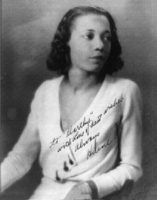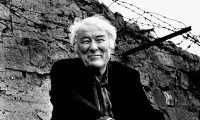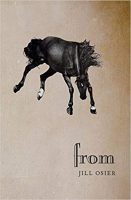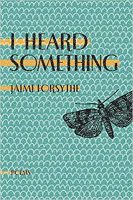July 6, 2018
Edited by David Sanders
Specimen Days
1533—Ludovico Ariosto, Italian poet (Orlando Furioso), dies at 57.
1859—Verner von Heidenstam, Swedish poet/novelist (Charles Men, Nobel 1916), is born.
1871—Antonio de Castro Alves, Brazilian poet (O navio negreiro), dies at 34.
1878—Eino Leino, Finnish poet (d. 1926), is born.
1914—Delmira Augustini, Uruguayan poet, murdered at 27.
1918—Bert [Lambertus H] Voeten, Dutch journalist/poet (Crossing), is born.
1948—Wadih Saadeh, Lebanese-Australian poet, is born.
1995–Helene Johnson, American Harlem Renaissance poet, dies at 87.

The Sandman
He catches dust o' dreams to carry in his sack,
The dust a falling star leaves shining in its track,
He walks the milky-way, then down the dark-staired skies,
His tinkling footsteps hush the world with lullabies.
And when he reaches you, his fragrant gentle hands
Fill deep your drowsy eyes with fairy golden sands.
—Helene Johnson
“And when he reaches you, his fragrant gentle hands / Fill deep your drowsy eyes with fairy golden sands.” – Helene Johnson
World Poetry
Poet Tanikawa Dedicates Work to Chinese under House Arrest

A poem by Shuntaro Tanikawa was included in a clandestine mission to send a message to Liu Xia, a Chinese poet who has been under house arrest in Beijing for more than seven years. Liu Xia, 57, is the widow of Chinese human rights activist Liu Xiaobo, who won the Nobel Peace Prize while in prison in 2010.
Poet who Performed before Harry and Meghan’s Wedding ‘was strip-searched by police after they falsely accused him of driving without insurance’
One of Britain's most prominent young poets and a friend of Prince Harry lashed out at police yesterday for strip-searching him 'out of nowhere' after a performance. George Mpanga, 27, known as George the Poet, said he was 'handled like a second-class citizen' by police who 'made up lies' about him being aggressive and having weapons.
A poem by Shuntaro Tanikawa was included in a clandestine mission to send a message to Liu Xia, a Chinese poet under house arrest.
Recent Reviews
Aimless Love by Billy Collins review – whimsical and moving
The much-loved American author’s inventive collection is intelligent, accessible – perhaps a little too cosy at times
by Ben Wilkinson
Dubbed the “most popular poet in America” by the New York Times, Billy Collins has won countless admirers for his chatty, witty, wholly dependable poetry. At pains to welcome the reader with avuncular charm, he writes lines that are more serious than they seem, though by how much, you’d be hard pressed to say. Wry and self-mocking, his favoured territory is the suburban everyday – a pop song stuck in your head; people-watching on public transport; a “perfect” spring day – though he is most at home striking a knowing and self-referential pose, “looking every inch the writer / right down to the little writer’s frown on my face”.
Some Notes on Literary Power and Shane McCrae’s The Language of My Captor
by Jonathan Farmer
Shane McCrae’s latest book of poems opens in the voice of a man, presumably from somewhere in sub-Saharan Africa, who has been captured and turned into an exhibition in what is presumably the United States.
Review: Cherokee Road Kill
by Cassie Pruyn
Set in the Great Smoky Mountains of North Carolina, Celia Bland’s third poetry collection, Cherokee Road Kill, unfolds over the course of two unnamed sections. Like the accompanying drawings by artist Kyoko Miyabe, the poems are etched with exquisite detail. Throughout the book, Nantahala, a New Deal–era man-made lake that drowned a Cherokee town, surfaces time and time again, offering up a metaphor that serves to illuminate Cherokee Road Kill’s conceit.
What Does It Mean to Be an American? A Poet Reflects on Race in a Divided Nation
by Elizabeth Lund
Terrance Hayes reinvigorates a classic form in his latest book, American Sonnets for My Past and Future Assassin (Norton). In these 14-line, free-verse poems, all with the same title, Hayes examines what it means to be an American, to belong, and how it feels to be haunted and hunted by violent racism. Hayes, who won the National Book Award in 2010 for “Lighthead,” addresses that ubiquitous “assassin” directly in some places.
Dubbed the “most popular poet in America” by the New York Times, Billy Collins has won countless admirers.
Broadsides
John Ashbery’s Humane Abstractions
by David Herd
The focus of this essay is The Double Dream of Spring.1 In the context of John Ashbery’s long career it is possible to a claim a particular significance for that book. Published in 1970, it was the first volume he wrote after re-settling in the United States in 1965, having lived in Paris for the best part of a decade. It was also the book in which he arrived at a kind of poem – ‘Soonest Mended’ is an example, but so are several others, ‘Evening in the Country’, say, or ‘The Bungalows’ – that established a way of configuring voice, narrative trajectory, human relations and cultural reference that would become recognisable as characteristically Ashberyan.
Beyond the Page
by Jade Cuttle
I recently reviewed Kaveh Akbar’s debut collection Calling a wolf a wolf, and was fascinated by how this Iranian-American poet bundles together a series of self-portraits, all haunted by their own impossibility. Sandeep Parmar, the award-winning poet and co-founder of the Ledbury Emerging Poetry Critics scheme, pointed recently to the fact that when BAME poets are reviewed, their work is often reduced to a function of their “identity” or background.
I recently reviewed Kaveh Akbar’s debut collection and was fascinated by how this Iranian-American poet bundles a series of self-portraits.
Drafts & Fragments
An Editorial Exchange: Donald Hall and George Plimpton

Dear George, You are quite unlike anything else on the planet. Open up Vogue, and there is George among the yachts at Newport. Open up my Paris Review envelope, and there is George among Corso, Ginsberg and Kerouac. Dear Podhoretz would probably say that it follows, but I am not so sure. I believe in the sincerity of most of these people. I happen to agree with what most of them feel about America, and I expect that when the war comes Ginsberg and I will be in the same concentration camp.
Fighting Pollution with Poetry in Nigeria
Can poetry save the planet? A group of students at the University of Lagos thinks it can certainly help! They've set up the Parliament of Poets initiative, using poetry to educate people about the environment.
Veterans’ Poems Address Psychic Wounds of Vietnam
ByShai Ben-Yaacov
Good writing often has its roots in trauma. And for Americans who served in the Vietnam War, it’s sometimes hard to separate personal trauma from anger at the government that sent them to a war they felt — or came to feel — was unjust. Some of the poetry composed in that era reflects those themes — as well as racism, propaganda, and the disillusionment that often comes with returning home. NewsWorks Tonight producer Shai Ben-Yaacov spoke with five Vietnam veterans, most with poems cited in “A Shadow on our Hearts; Soldier Poetry, Morality, and the American War in Vietnam.”
Dear George, You are quite unlike anything else on the planet. Open up Vogue, and there is George among the yachts at Newport.
Poetry In the News
Seamus Heaney’s Family on Life with the Great Poet: ‘He was always just Dad at home'

Ahead of a Dublin exhibition of the poet’s archive, the Heaney family explain how they put together a new collection to reflect his life as a husband and father, as well as a Nobel laureate.
Tim Murphy, Poet of Plains and Pheasants, Dies in Fargo
Timothy Iver Murphy, a celebrated poet who wrote of hunting pheasants and doves in the Dakotas with his beloved dogs, died Saturday, June 30, in his Fargo home. He was 67.
The Heaney family explain how they put together a new collection to reflect his life as a husband and father, as well as a Nobel laureate.
New Books
from by Jill Osier
[Paperback] Bull City Press, 30 pp., $12.00

"These poems shine with the deep intelligence of gentleness and of a quiet, sustained concern. To read them is to be reminded of Robert Creeley's passionate advocacy of Hart Crane, a passion that reached crescendo in the exclamation (in a letter to Charles Olson) 'Dammit, isn't that gentle!' Here is a poet whose primary commitment is to attention, a poet who simultaneously understands and avows that attention is now and ever shall be the vivid prime of Love. I neither blush nor hesitate to say that such avowal is literally angelic. This poet's 'Requiem' gently but unequivocally proposes point-of-view as an angelic imperative, gentle on its very face: 'Try / to remember the smell of sun through it all. It's / a rare courtship.' Love courts attention, and attention in return is both courted and empowered by love. The upshot? 'There was a beating / of silence then, until it was a new quiet…' It is the bright substance of this 'new quiet' I am happy to welcome and to acknowledge. It is surely the peaceable frontier of joy."–Donald Revell
Defense of the Idol by Omar Caceres, translated by Monica de la Torre
[Paperback] Ugly Duckling Presse, 64 pp., $15.00
Branded a "poète maudit" for the cryptic circumstances surrounding his life and death, Omar Cáceres once tried to destroy all copies of his one and only book. The myth around him survived thanks to the inclusion of fifteen poems from Defense of the Idol in the groundbreaking anthology Antología de poesía chilena nueva from 1935. Presented here for the first time in English translation, along with the sole foreword Vicente Huidobro ever wrote for a poet, the poems of Cáceres possess a ghostly, metaphysical energy combined with modern-age imagery: bows pulsate, moons hurtle, rains sing, trees drag their shadows in drunk stupors, winds break the sky open. But the interior life of the poet assumes dominance, interrogated through anguished, turbulent dreamscapes of language.
I Heard Something by Jaime Forsythe
[Paperback] Anvil Press / A Feed Dog Book, 96 pp., $18.00

In her uncompromising follow-up to 2012's Sympathy Loophole, Jaime Forsythe offers a breathless cascade of evocative somethings: mysterious sounds, faint rumblings, biographies real and imagined, tabloid rumours, nagging memories, an animal stirring, a baby waking, a storm threatening, an escape hatch beckoning, and an inexplicable machine coughing into motion somewhere in the distance. The poems in I Heard Something comprise a surreal menagerie — funny, chilling, tender — of what it is to be a human at this very minute. Cup a hand around your ear as you read this book — it'll enhance the experience.
Levon Helm by Jason Morris
[Paperback] Ugly Duckling Presse, 80 pp., $17.00
Levon Helm is Jason Morris' first full-length collection, a picaresque situated in the drum and voice of mind. Like the drummer-singer with whom it shares a name, its influences are broad but firmly American. Along with bits torn from the edges of Moby-Dick and The Maltese Falcon, it mines the margins of Sonic Youth's Daydream Nation. As it takes stock of the immediacy and scale of places in the American West like Pinnacles and the Puget Sound, its psychic roots dig a haunted, old New England. These lyric poems are takes on human memory in geological time, as interested in their own asides and parentheticals as they are in the elements.
Born Again by Ivy Johnson
[Paperback] The Operating System, 112 pp., $18.00

"Born Again is a book about the redemptive power of the singular voice, arising from the mixture of a multitude of voices, coming together as a single flame to light the way through a landscape of sorrow, evil, extreme beauty, and extreme feeling. The book teeters between definitions of poetry and the essay form to come upon the right way to say the unsayable, telling us things like: 'I am nothing like a tree / You think I'm in a drought / You think I'm shriveling up / You are wrong.' Ivy Johnson is a poet who believes that the I and the spirit are intertwined forever in the act of the poem. She gives the poets of today and tomorrow the permission to gain strength from the force of the persona, with its ability to surround trauma and alchemize it into the sort of language that sustains. Johnson tells us: 'I am free I am free /Believe me I am.' And we do believe she is free. And we believe, in her poems, we are, too."–Dorothea Lasky
Born Again is a book about the redemptive power of the singular voice.
Correspondences
On Apocalyptic Poetry: Brandon Brown and Claire Marie Stancek in Comversation
In 2017, we (Claire Marie Stancek and Brandon Brown) corresponded with each other on the occasion of two new books: Stancek’s debut Mouths (Noemi) and Brown’s slim volume of poems, The Good Life (Big Lucks). In the meantime, we each saw a new book into the world: Brown’s The Four Seasons (Wonder) and Stancek’s Oil Spell (Omnidawn). We initiated this discussion in the spirit of friendship and mutual admiration, having both been readers of each other’s works and living for the most part in the same place, the east Bay Area of California.
The South American Poet Embracing a Language of Maybes
by Nick Fouriezos

Because Susy Delgado isn’t just writing great poetry but also preserving an ancient language in the process.
Susy Delgado’s voice rises in soft staccato bursts, fluttering then falling, rolling quietly through question mark inflections in conversation with herself. The push and pull fits a poem combining Spanish and Guarani, the indigenous language of the rural and native Paraguayan people. She reads the first lines of her bilingual tome — Yvytu yma, or Viento viejo, translated “old wind” — which won the country’s national literature prize last year. Her words breeze through her own storied career, one that has taken the 68-year-old from the then-rural farmlands of nearby San Lorenzo to the concert halls of Buenos Aires and Madrid and London as a professional dancer, and finally ending up here, where she serves as an adviser to the minister of culture in the sweltering Paraguayan capital of Asunción.
Mucha Muchacha, Too Much Girl: An Interview with Leticia Hernández-Linares
by Therese Marie Konopelski

Mucha Muchacha, Too Much Girl is a lyrical celebration of inspirational El Salvadoran womanhood. Hernández-Linares' poetry explores the centrality of place and community when home is unreachable and unrecognizable. These women of San Francisco's Mission District are the flowers in Leticia's poemsongs, the "flores" in Leticia's "canciones." She channels a long tradition of Central American poetry championing resiliency and heroic individuality.
Because Susy Delgado isn’t just writing great poetry but also preserving an ancient language in the process.
Envoi: Editor’s Notes
Tim Murphy: In Memoriam
The Pallbearers
At the prairie cemetery
where the river meets a road
and Murphys come to bury
love in the loam we've sowed
my brother lets me carry
the light end of the load.
—Timothy Murphy (1951–2018)